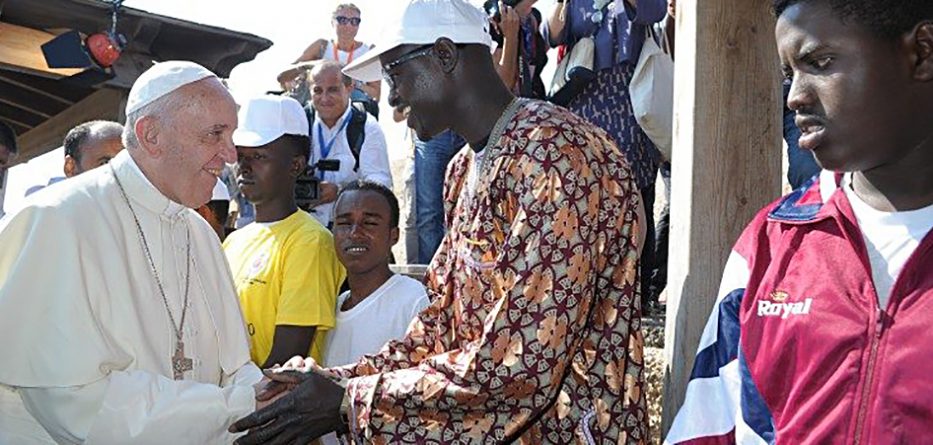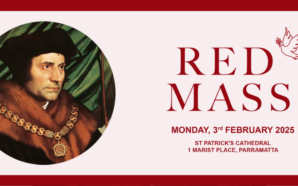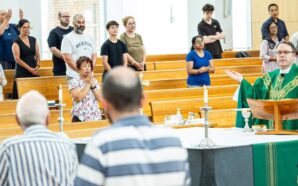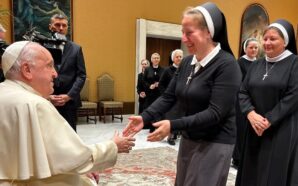Because God asks for mercy, not sacrifice.
Never has a pope focused so consistently on a social issue as has Francis on migration these past ten years. With his actions and his words, he has put the mass displacement of people and their suffering at the center of his Petrine ministry. What St. John Paul II did for the unborn and the ethic of life, Francis has done for migrants and the ethic of fraternity. Just as the Polish pope is forever associated with challenging the Berlin Wall and the Iron Curtain, the Argentinian pope will surely be remembered for the searing spotlight he has thrown on the Florida Strait, the Mediterranean, and the U.S.-Mexico border. He is the greatest advocate on the world stage for migrants and refugees, and the scourge of the kind of conservative cafeteria Catholic who tries to downplay the exclusion of foreigners as a major moral issue.
It is usually pointed out that just as communism was personal for Karol Wojtyła, so is migration for Jorge Mario Bergoglio. As the child of Italian émigrés who remade their lives in Buenos Aires in the 1930s, he knows firsthand about the vulnerability of those who have been uprooted. The other obvious reason for Francis’s focus on migrants is the scale and urgency of the matter. There have never been as many people on the move as there are today: the UN’s pre-pandemic estimate was an astonishing 70 million. If they were a country, it would be the fifth largest in the world, after China, India, the United States, and Indonesia. Yet an astonishing 85 percent of all migrants are hosted not by Europe or North America, but by the developing world.
Climate change, the other great challenge facing today’s world, has at least drawn from world leaders a pledge to tackle it collectively through the annual UN COP meetings. But on migration, the opposite has happened: countries compete with each other to be the least hospitable in a race to deter newcomers.
Francis has made it his job to call out this shameful lack of collective purpose, the consequences of which are visible in border camps where hundreds of thousands languish in degradation after being trafficked across seas and deserts. His advocacy famously began on the island of Lampedusa in July 2013, when he described Europe’s response to the drownings in the Mediterranean—the world’s most dangerous crossing, claiming two thousand lives in 2021 alone—as evidence of “the globalization of indifference.”
Yet neither the current scale of the problem nor Francis’s own background is sufficient to grasp why he cares so deeply. Yes, migration is personal for him; and yes, the world’s paralysis on the question cries out for his prophetic voice. But a deeper motive emerges from the more than seven hundred pages of words he has written and spoken on the topic, which the migrants section within the Vatican’s Dicastery for Promoting Integral Human Development has collected on its website. (That section, created in 2018, is the only one in the Vatican that Francis heads personally.) The main reason Francis, as successor of St. Peter, has put this topic at the heart of his pontificate is that—to paraphrase Bill Clinton—it’s the Gospel, stupid. Or, to put it in slightly more ecclesial language, migration in the early twenty-first century is where we find the great hermeneutic question of the Gospel being asked and answered: Mercy or sacrifice? In the borderlands of our globalizing world, God knocks at the door disguised as a foreigner. On our recognition and acceptance of that stranger hangs not just the fate of migrants, but of humanity itself.
The “hermeneutic of sacrifice” is the indifference of Cain toward the fate of Abel, whom he has disposed of: “Am I my brother’s keeper?” (Genesis 4:9). It is born of rivalry, of the fear that the other will dispossess me unless I dispense with him. The “hermeneutic of mercy,” on the other hand, is the response of Yahweh to Moses in the third chapter of Exodus: “I have observed the misery of my people…. I have heard their cry…and I have come down to deliver them” (Exodus 3:7–8). When Jesus in Matthew tells the Pharisees to go ponder why God asks for mercy, not sacrifice, he is inviting them to understand salvation itself (Hosea 6:6).
To choose the hermeneutic of sacrifice, as most of the rich world is doing now, is to be driven by indifference and fear. It is to believe that the death and suffering of a large swath of humanity is a cost our lifestyle must budget for. It is to fear dispossession, the unknown; it is to be blind to the possibility of our transformation, and to choose, in the long term, our destruction. To opt for the hermeneutic of mercy, on the other hand, is to see the world as a place of great abundance, in which all is gift, and to see in the welcoming of migrants the possibility of another kind of future. It is to realize, as Francis said last year in Malta, that “the Kingdom of God must be built with migrants and refugees and victims of trafficking, for without them it would not be the Kingdom that God wants.” And “for Christians too, in play is our fidelity to the Gospel of Jesus, who said: ‘I was a stranger and you welcomed me’ (Matthew 25:35).”
Francis has not written an encyclical on migration as he did for the ecological question because he has not needed to: the topic runs through all his teaching documents. In Evangelii gaudium (2013) he calls countries to a “generous openness” that will create rich new forms of diversity; in Laudato si’ (2015) he highlights the tragic rise in migrants fleeing environmental degradation and calls for collective global action on both; in Amoris laetitia (2016) he speaks of the traumatic impact of migration on families; in Gaudete et exsultate (2018) he is amazed that any Christian could consider migration a secondary issue, and cites Scripture to make clear his concern is “not a notion invented by some pope.” To these can be added his nine annual messages to mark the World Day of Migrants and Refugees, aimed equally at the Church and world leaders. And then, of course, there are the visits, and not only to the camps where refugees are simultaneously rejected and cared for. Wherever he travels in the world—most recently to Congo and South Sudan—he includes a meeting with migrants whenever possible.
During the course of his pontificate, Francis has developed two key insights with respect to migrants. First, building a collective subject capable of meeting current challenges lies in our capacity to see the needs of the stranger—to form a “people” capable of acting “more and more as a single family dwelling in a common home,” as he puts it in Fratelli tutti. Second, in the process of helping to construct that collective subject, we demonstrate both our human fraternity and our fidelity as a Church to Christ. As Francis put it in his first message for the World Day of Migrants and Refugees, “migrants and refugees…are an occasion that Providence gives us to help build a more just society, a more perfect democracy, a more united country, a more fraternal world and a more open and evangelical Christian community.”
Francis builds on a modern papal teaching that stretches back to the nineteenth century, when the great wave of transatlantic migration from Catholic Europe to the Americas demanded a pastoral strategy of accompaniment. The Church became a key actor in the resettlement and integration of émigrés—as the Piedmontese Salesians were for the Bergoglio family in Buenos Aires—and the Church is still today the single largest agent of integration of migrants across the world. But there was no specific papal teaching on the ethics of migration until the vast displacement of peoples as a result of World War II. Then came Pius XII’s 1952 postwar apostolic constitution, called Exsul familia nazarethana after its opening line: “The émigré Holy Family of Nazareth, fleeing into Egypt, is the archetype of every refugee family.” Likewise, every refugee family is an emblem of the Holy Family.
The third major migration wave under John Paul II led to Erga migrantes caritas Christi in 2003—the same year that the U.S. and Mexican bishops penned their document on migration, “Strangers No Longer.” Both were written against the backdrop of a new global order in which capital and goods flow freely but most people cannot, and in which migration is increasingly global, from south to north. The teaching reflected a new effort to deal with the human consequences of globalization. Since then, in the past twenty years, the schizophrenia of the contemporary Western order—economic growth based on cheap labor combined with a politics of hard borders at a time of falling fertility—has only gotten worse.
Now, after a decade of Francis as pope, we can declare a fourth phase in the development of Catholic social teaching on migration. As Dr. Anna Rowlands points out in her excellent book Towards a Politics of Communion: Catholic Social Teaching in Dark Times, Francis has drawn attention to the suffering and tragedy of the liminal spaces between nation-states, the no man’s lands where the absence of refugee-sharing agreements among states is leading to brazen violations of UN conventions, and where hard-border politics have led to the creation of vast new human-trafficking networks controlled by criminal gangs.
As he crossed the Sahara on his way to Congo in February, Francis offered “a prayer for all the people, who, in search of some well-being, some freedom, have tried to cross [the desert] and did not make it. So many suffering people who arrive in the Mediterranean after crossing the desert are taken into the refugee camps and suffer there.” Addressing migrants in South Sudan, Francis noted how “great numbers of children born in recent years have known only the reality of camps for displaced persons,” where, losing all connection with their native land and its traditions, they live ghostly lives, unable to move either forward or backward. “The future cannot lie in refugee camps,” the pope made clear.
From these interstices of the world—Lampedusa, Malta, Lesbos, Ciudad Juárez, Dhaka, Rabat—Francis has issued what amounts to an encyclical’s worth of significant gestures, including many of the most striking and news-making of his pontificate. Famously, he has returned from Lesbos twice with migrants on board his plane, the first time with twelve Muslim families, while dozens more have been accepted by the Vatican through the Community of Sant’Egidio’s “humanitarian corridors,” which have been negotiated with the European Union.
Some of these gestures are meant to challenge the wall-building drive of populist nationalism; others have happened spontaneously—as when the pope cried with 600,000 Muslim Rohingya refugees in Dhaka, Bangladesh, in November 2017, and said what was in his heart: “The presence of God today is called Rohingya.” Whether planned or impromptu, all these gestures are the fruit of a deeper discernment about this moment in our human story: the way migrants are treated tells us something vital both about the spiritual state of our society and the path to our salvation.
That path begins with facing the truth about what we have become. More than two million people have tried to cross the Mediterranean to Europe since 2014, mostly from the Middle East and sub-Saharan Africa; at least twenty-five thousand of them have died in the process, victims of the irresponsibility of human traffickers, but also of the decisions of border authorities whose countries are intent on deterring such journeys. In February 2015, two years after Francis’s first trip to Lampedusa, another migrant boat sank off the island. It was carrying a thousand people, each of whom had been charged $1,500 by traffickers. After Italy raised the boat and towed it to land, autopsies were performed. There were layers and layers of bodies crammed onto the boats, like nineteenth-century slave ships.
In his Lampedusa homily, Francis quoted Genesis. God, he said, was asking us all, “Where is the blood of your brother which cries out to me?” But Francis began his homily earlier in Genesis, with God calling out to Adam: “Where are you?” Francis noted how Adam had “lost his bearings, his place in creation, because he thought he could be powerful, able to control everything, to be God.” In this mentality, the “other” ceases to be a brother or sister and becomes instead a threat to my life and comfort.
Francis tells the same story of moral disorientation in Laudato si’, where he describes it as “the loss of that sense of responsibility for our fellow men and women on which all civil society is founded.” On Lesbos and Malta, he has spoken of the stranding and capsizing of boats of refugees as a “shipwreck of civilization.” In Cyprus he said: “We read stories of the concentration camps of the last century and we say, ‘How could this possibly have happened?’ Brothers and sisters, it is happening today, on nearby coasts!”
But the pope does not stop there, because he has another point to make: in every situation of apparent despair where sin proclaims victory, God is always present; his prevenient grace arrives on the scene long before we do. In Let Us Dream, Francis quotes the poet Hölderlin—“where the danger is, there grows the saving power”—and says that the phrase has been with him often in his life. It is the key to his discernment on the migrant crisis. God acts in this crisis, as in every crisis, through his mercy, which is future-changing insofar as we have the capacity to receive it. Francis’s role as pope is to alert us to the obstacles and temptations that block God’s mercy.
He encourages us, first, to face the truth, to see what is happening; then to repent and weep, to feel shame and cry out for help; then to see clearly where God is calling us; and finally, to have the courage to act on that clarity. Francis used the story of Jonah to explain this dynamic at the February 2016 border Mass in Ciudad Juárez–El Paso. God’s merciful response to Nineveh’s path of self-destruction was to send the reluctant prophet to “wake up a people intoxicated with themselves,” as Francis put it, to help them see and to weep over what they had become.
Enter, at this point, the Good Samaritan. At Lampedusa, Francis likened the world’s refusal to take responsibility for the suffering of migrants to “the hypocrisy of the priest and the Levite.” The hypocrisy is that the very people tasked with mediating God’s mercy turn out to be in thrall to the logic of sacrifice. They turn from the ailing stranger, he explains in Let Us Dream, because “they are trying to preserve their own place—their roles, their status quo—faced with a crisis that tests them.” Their religiosity has become an identity they cling to fearfully; and in appropriating religion for enrichment or self-preservation they have corrupted it. Incapable of mediating God’s merciful action, they fail to create a new future either for the wounded man or for themselves. The despised “irreligious” foreigner, on the other hand, mediates God’s logic of mercy. By stopping and responding to the suffering stranger, the Good Samaritan triggers a new future for them both—and not only for them.
Francis explores this in chapters 2 and 3 of Fratelli tutti, where he plays with the twin hermeneutics of mercy and sacrifice. The parable of the Good Samaritan presents “the basic decision we need to make in order to rebuild our wounded world,” the pope notes: namely, whether “to include or exclude those lying wounded along the roadside.” That choice “places into second place distinctions of function or category (priest or merchant, Jew or Samaritan) leaving essentially only two kinds of people: those who care for someone who is hurting and those who pass by.” A new future of fraternity is made possible by those willing to transcend their functions and roles.
This is about more than immigration: it is about salvation. But in the gospels the two are inseparable. In Luke, Christ is born to a refugee couple internally displaced by an imperial power’s bid to tax the poor to pay for the costs of military occupation. In Matthew, it is one of Rome’s proxy rulers, who, driven by insecurity, seeks the death of the Christ child, forcing the Holy Family into exile. In both cases, the story of salvation is played out in a familiar migrant story that sums up the experience of God’s chosen people, who were deported and enslaved.
In both accounts God has entered history as a migrant, and the response to that migrant is what drives the drama of salvation. Rejecting or failing to recognize the stranger impedes the creation of a new future: God cannot make his home among us if we will not let him. Recognition and hospitality have the opposite effect: they open the door to an amazing transformation. John’s Gospel, lacking an infancy narrative, expresses the drama in theological terms. On the one hand, “He was in the world but the world knew him not; he came into his own domain / and his people did not accept him.” On the other: “But to all who did accept him / he gave power to become children of God” (John 1:10–12). Non-recognition and rejection—the logic of sacrifice—keep us stuck in sin and division; recognition and hospitality—the logic of mercy—create a new future.
When Jesus dramatizes the choice in Matthew 25—“I was a stranger and you welcomed me…. I was a stranger and you never made me welcome”—he recounts that all those facing judgment are equally astonished. “But when did we see you a stranger?” they all ask. They are all amazed because none of them had seen God in the stranger, whose divinity was concealed. But all had seen the stranger. It was not what they saw but rather their response to it that differentiated them. This was the same challenge faced by the Levite, the priest, and the Samaritan: They all saw the stricken man well enough, but how did they respond to him? As a person of value in need? Or as someone of no account, who deserved their attention only insofar as he was a potential threat to their comfort or convenience? In other words, did they see him through the hermeneutic of mercy—stopping and responding concretely to a person in need—or the hermeneutic of sacrifice, in which the one in need is ignored, avoided, or cast aside?
The Samaritan’s response triggers a conversion captured in the chapter titles of Fratelli tutti: from “Dark clouds over a closed world” via “A stranger on the road” to “Envisaging and engendering an open world,” “A heart open to the whole world,” and so on. Instead of clinging to one’s identity and tribe, one opens oneself up to another kind of humanity, an authentic universal fraternity in which compassion for all human beings—the foreigner, the stranger, the marginalized, the outsider—becomes the foundation of a new kind of society. In chapter 3 of Fratelli tutti, Francis uses the Greek word ekstasis, the going out of self to find a fuller existence in service to the other, especially the other who is outside our own tribe. “Every brother or sister in need, when abandoned or ignored by the society in which I live, becomes an existential foreigner, even if born in the same country,” Francis notes. The way we receive all outcasts becomes the test of our capacity for society itself, for moving from “I” to “we.”
Fratelli tutti cites an essay by Paul Ricoeur, Le socius et le prochain, which contrasts the “associate” or “partner” with the “neighbor” in the sense Jesus uses the term in the Good Samaritan parable. Ricoeur says that Jesus’ answer to the question “Who is my neighbor?” is that “the neighbor is not a social object but a behavior in the first person…. I do not have a neighbor; I make myself someone else’s neighbor.” The pope calls this exercise of free will a “consciously cultivated fraternity.” It is the choice to move beyond our social role or function (le socius) to make ourselves a neighbor (le prochain). These two categories are not in opposition, but need each other. Relationships of mutual self-interest, partnership, and contract are the backbone of institutions; they are how you get stuff done, as the Church itself exemplifies in its manifold projects and organizations. As Ricoeur notes, the act of “neighboring” passes through social institutions such as the inn where the Samaritan delegates the care of his wounded charge. Indeed, a healthy association (or institution, organization, or nation) constantly renews itself by “neighboring” the stranger.
The problem comes when an association becomes a defense against the stranger. As Francis puts it: “those capable only of being associates create closed worlds.” When the hermeneutic of sacrifice dominates institutions or associations or the politics of whole nations, they become defensive, geared to exclusion, “closed and self-referential structures” in which the word “neighbour” loses all meaning, as Francis puts it in Fratelli tutti. Once our institutions, including the Church, become safe places we retreat to in order to resist outsiders, they become incapable of growing themselves and of renewing society. As the pope notes of the priest and the Levite in his contemplation of the Good Samaritan: “A believer may be untrue to everything his faith demands of him, and yet think he is close to God and better than others.” Jesus makes clear that there is only one authentic guarantee of fidelity to God, and that is “a way of practising the faith that helps open our hearts to our brothers and sisters.”
Partnerships and associations that turn their backs on the stranger are destined for putrefaction. They may be rich and successful, but they are dead inside. Social bonds are reduced to a tool for the pursuit of individual interests, rather than a realization of a common project. Emptied of love, such relationships shrivel: they become cold, contractual, conditioned by the logic of the market. What in Catholic social teaching is called the “common good” becomes incoherent or even incomprehensible. Politics swings between a liberal globalism that exists only to further wealth-creating partnerships and a nationalist populism that divides society into “the people” and the elites, patriots and foreigners.
For the past decade the successor of St. Peter has insisted that while the Church must care about many things and raise its voice in many fields, it cannot evangelize without urging that the stranger be welcomed. Francis has shown us the pattern of such evangelization over and over. The pattern has three parts.
First, contemplate. In the Ciudad Juárez homily, Francis spoke of God sending Jonah to awaken us to what is happening. This is the first task of the Church: to tell the truth, and to tell it in human terms. “This crisis which can be measured in numbers and statistics, we want instead to measure with names, stories, families,” the pope said in Juárez. When we look squarely at reality—when we refuse to turn away from the suffering of migrants and the complexity of migration—we cannot exempt ourselves from the question: When I look at them, at this, is there something I fear to lose?
Second, discern. Perceiving God’s grace in the migrant crisis begins with looking and then moves to a question: What can be done? What are we being called to through this crisis? In discerning the spirits involved in this question, I must try to recognize not only God’s spirit but the bad spirits opposed to it, unmasking, as Francis does in Fratelli tutti, the mediocrity and lies of contemporary political discourse based on sacrifice.
The bad-spirit discourse casts the issue in terms of polarized choices: either-or, us-or-them. Francis rejects this framework. For him, it is never about choosing between foreigners and the native-born. He also exposes as false the narratives of scarcity and rivalry underlying hostility to migrants, the pseudo-Darwinian accounts of competition for scarce resources, in which the strongest win out and the weak are trodden underfoot. So, too, with the neo-Malthusian population panic beloved of tabloid newspapers. Francis frequently reminds Europe of its “demographic winter,” and of the vital importance of migration to its economy, history, and culture. As an alternative to “narrow forms of nationalism,” Francis offers a vision of mutual interdependence and reciprocity in a world of plenty. He reminds us of what the history of nations shows: a healthy, dynamic society is one whose roots are constantly nourished by incorporating the gifts strangers bring. As Francis says in Fratelli tutti, “a healthy openness never threatens one’s own identity.”
Third, act. In September 2015 Francis asked every parish and religious community in Europe to house at least one migrant family “fleeing death by war and hunger.” Earlier he told religious communities facing decline to open the doors, telling them that “empty convents do not belong to you, they are for the flesh of Christ, which is what refugees are.” The Vatican’s migrants section offers a comprehensive collection of “pastoral orientations” that we are invited to adopt as individuals and as communities, as well as policies we can urge on governments. All these proposals challenge the logic of sacrifice and apply the hermeneutic of mercy.
Throughout his pontificate, Francis has consistently argued that borderlands are the places where the Gospel is being both resisted and enacted in our time, just as they were two thousand years ago. Then as now, God enters our human story as a wounded stranger, a migrant who has just one question in his or her heart: Will I be made welcome by people I can trust? The answer to this question given by the logic of sacrifice—sacrificing them to protect us—threatens to plunge us all into a dark future of closed borders and growing violence. To embrace the strangers at our borders, to help them and their children put down roots among us, we must be willing to undergo a conversion of heart. We must face our fears and anxieties and allow mercy to overcome them. We must undergo some existential self-displacement, for such is love. Even just a gesture of recognition and hospitality can be enough to start with. It is enough for God to enter, to save us.
Austen Ivereigh is a British biographer of Pope Francis, and a Fellow in contemporary Church history at Campion Hall, Oxford. This is a condensed version of the 2022–2023 Hispanic Ministry and Theology Lecture he gave at Loyola Marymount University in Los Angeles on January 31, 2023.
Reproduced with permission from Commonweal Magazine.








